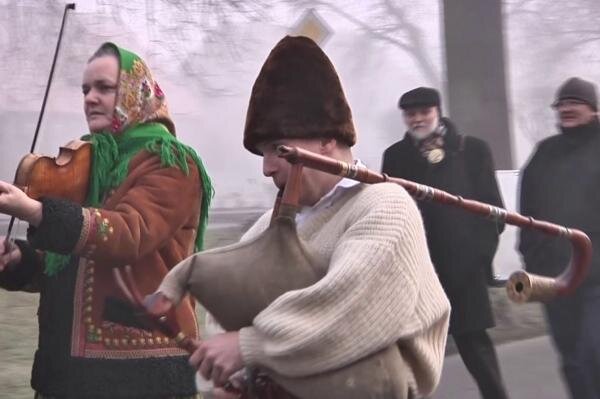The Truth About Bagpipes
You know you are in Scotland when you hear the sound of Scotland’s National instrument - the bagpipe - floating over the heathered mountains, lochs and pine forests. The bagpipes are as central to Scottish identity and culture as kilts, haggis and whiskey. But the pipes have an unsavoury history, they were not invented in Scotland and were played by the dastardly English the hundreds of years before the Scots.
Before I entirely rip apart Scottish culture, let talk about the history of the bagpipe.
Hittite Carving
Before you feel like I’m entirely ripping apart Scottish culture, let’s talk about the history of the bagpipe. It is speculated that pipes came about as far back as ancient Egypt. I’ve read about an ancient Egyptian carving, showing a street musician with what seems like a bagpipe chanter and bag under the left arm. I can’t however seem to find a photograph of this, but did find a carving of this description from the Hittite empire that was around at the same time as the ancient Egyptians but in what is now Turkey. The Hittite did have a lot of trade with Egypt so it could have been passed on from the Egyptians. However, the Hittite although lesser known were great inventors, known for their fast chariots, and could have just invented it themselves. It is widely thought that the bagpipe, whether an Egytian or Hittite invention, was then passed onto the Greeks who then gave it to the Romans.
And that is where the first written records of pipes with bags came from - it is written that Emperor Nero of the ancient Romans could “play the pipe, both by means of his lips and by tucking a skin beneath his armpits”. Here comes the first blasphemous piece of history - in the form of the Legend of Caesar’s bagpipes’ during the conquest of Britain. The story tells of Caesar, in an effort keep the Roman casualties to a minimum, decides to ambush the Celts. He did this by asking his pipers to hide and at the prearranged signal, all play at once. The Celtic horses bolted, threw their riders, and the Roman Army rushed in. The Romans used the original pipe band against the Celts!
Tewkesbury Abbey, Gloucester
Legend says that when the Britons realised what had happened, they believed the bagpipe was divine with magical qualities. Hearing this, the English then copied the Roman instrument. In fact, there is an archaeological find at Tewkesbury Abbey, Gloucester, of a small altar, 2nd century A.D. depicting a figure playing an early type of bagpipe. So, perhaps it really was worshipped. Although this is all myth, what is clear is that the bagpipe became popular in Britain after the Roman invasion in the fourth or fifth century A.D. In fact, England became the centre of the bagpiping world, with Worcestershire, Nottinghamshire and Lancashire producing noted pipers and areas such as Cornwall, Northumberland, Lancashire and Lincolnshire made their own types of bagpipe. Strong evidence indicates that the Irish got the instrument from invading Anglo-Norman armies, while the French and Gaul Celts who lived in France, produced at least 7 types of bagpipes also inspired by the Romans.
St Martins Cross Iona
The earliest evidence of the pipe in Scotland is on St. Martin’s Cross at Iona from 750 A.D. Looking at it, it is a little of a stretch to say it is definitely a bagpipe. However, it would fit when the Normans came to the island, who definitely did have pipes at the time. The first unquestionable depiction in Scotland is in Rosslyn Chapel and Melrose Abbey’s carvings from the 15th Century. In fact, hilariously Melrose Abbey has a carving of a pig playing the bagpipes! Given the timing of carvings it is reasonable, although probably not a popular opinion, to assume that the tradition came up from the south. However, in 1528 a piper in Scotland witnessed a legal document indicating some degree of social status. From the 16th Century onward Highland pipers are referenced more regularly in documents and literature from the time. In the Scottish Lowlands, pipers became a regular part of bands of travelling musicians, performing at weddings and fairs and soon took over the harpist place as musician of choice. Whereas in the Highlands pipers occupied a more serious position in society, the instrument became more associated with war, replacing trumpets to inspire highlanders into battle.
Melrose Abbey Bagpipe Playing Pig
But by the 18th Century, it had become an icon of Scottish National Belonging, becoming linked to the Jacobite Movement and later the Jacobite Rebellion where Catholic Charles Stuart (otherwise known as Bonnie Prince Charlie) tried to take the throne from Protestant James II. Bonus Fact, Bonnie Prince Charlie did not take the throne and fled to France. The song “My Bonnie” was written and sung by the Jacobites who could pass it off as a love song when sung around their rivals.
The politicisation has led to a misconception that the pipes were banned in Scotland. In 1746, The Disarming Act came in to curtail Jacobitism and bring peace to the Highlands. It outlawed people in some parts of Scotland from having
“in his or their custody, use, or bear, broad sword, poignard, whinger, or durk, side pistol, gun, or other warlike weapon”
unless authorised. Two years later, Highland Dress including tartan, was also banned and in 1745 a piper James Reid was captured and sentenced to hang for treason for taking part in the Rebellion. However, the bagpipes never were forbidden, and his death was not to do with his profession.
Polish Bagpipe
It is interesting to note that bagpipes have been banned - in Poland during the second world war. Nazis threatened by the Polish national identity represented by the bagpipe, ordered the Polish people not to play their version.
The bagpipe has a vast family, with most countries from India to Sweden to Libya to Portugal having their own variety. Although the Scottish Bagpipe is part of a family, it has developed its unique sound and music through centuries of piping families work and dedication to the art. It has become well known worldwide mostly down to Scotland’s famous Highland Regiments in the expansion British Empire. Many Commonwealth and Ex-Commonwealth Nations now swap their indigenous bagpipes for the Highland Bagpipes in Military events. Thus, the world’s biggest producer of the instrument is Pakistan, where the industry was worth $6.8 million in 2010. The bagpipe’s popularity was also boosted when Scottish Pipers were military trained in the 1st and second world wars. This coincided with the decline of traditional bagpipes throughout Europe, which were replaced by classical instruments and later the gramophone and radio. This has been boosted even further with a resurgence in folk music, and even combining bagpipes and rock in a new genre called “bagrock”. Check out the Red Hot Chili Pipers, they are fantastic.
But all this got me thinking if bagpipes aren’t actually Scottish how much of our cultural identity is what we initially thought? Is our cultural identity defined by who wins the wars - the Romans or the British Empire? What do you think? Where are you from, and what defines your culture?
Don’t get me wrong, I love the bagpipes, and I love Scottish music. But I love it, even more, to realise that its development is linked to instruments, music, and people worldwide. That my Scottish upbringing means I am also part of even more incredible world culture - with diverse people, and diverse bagpipes. I realise that both world and local culture will shift and change just as it did in the back in Roman times, or with the Jacobites or with the invention of bagrock. It reminds me that we can try to be as divided as we want, but even something of specific cultural significance would not have happened if it wasn’t for a diverse array of cultures. So wherever we are from, let’s not shut out other cultures because of the differences. Let’s celebrate what distinct and differing cultures have and will bring to the world. Let’s celebrate diversity.
Resources
Bagpipe History: http://www.bagpipehistory.info/rome-ancient-world.shtml
The Great Highland Bagpipe: https://www.historic-uk.com/HistoryUK/HistoryofScotland/The-Piob-Mhor-or-the-Great-Highland-Bagpipes/
Brief History Of The Bagpipe: https://theculturetrip.com/europe/united-kingdom/scotland/articles/a-brief-history-of-the-bagpipe/
Scotia Pipers: http://www.scotiapipers.co.uk/bagpipe-history/
Bagpipe History: https://www.hendersongroupltd.com/resources/history-of-bagpipes/
Jacobite Rebellion: https://www.visitscotland.com/about/history/jacobites/
Hittites: https://www.ancient.eu/hittite/






